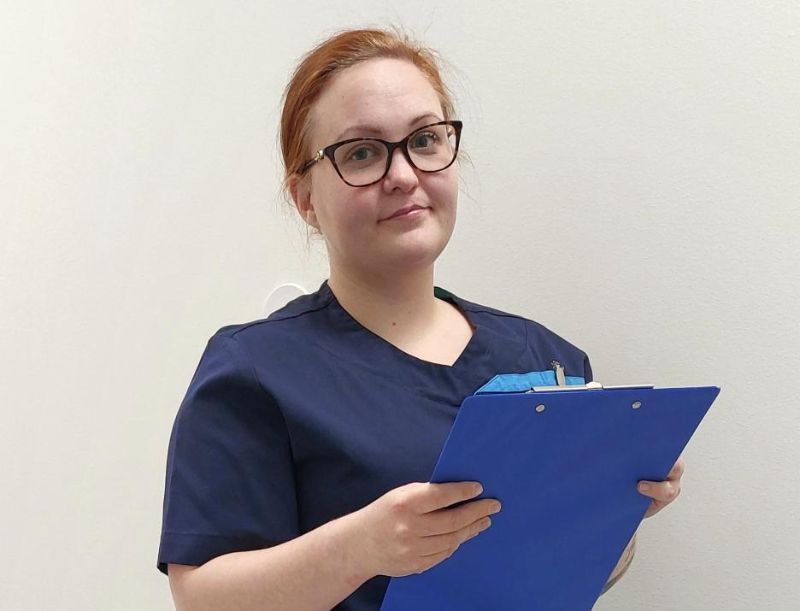Ward pharmacist
"The best thing is if you succeed in increasing the patient’s understanding or knowledge of their own medication in an interview situation. I also like the investigation work. In this job, investigating matters may require the use of several sources."

- Petra Rinne
- Acts as a ward pharmacist in the Hospital District of Helsinki and Uusimaa (HUS).
- Graduated with a Bachelor of Science in Pharmacy degree at the University of Helsinki.
- Five years of work experience in the field.
Briefly explain what you do for a living.
I work as a ward pharmacist at an outpatient clinic and ward in specialised medical care. My main task is to check home medication lists. In other words, I examine what kind of medication the patient is taking at the time I’m doing the medication review. I usually do this by interviewing the patient and examining the drug delivery information from the Prescription Centre.
I also look for answers to different questions related to medicines, familiarise myself with pharmaceutical matters and carry out tasks related to the pharmaceutical logistics of care units. In care units, ordering medicines is usually a task that belongs to the ward pharmacist. However, my job description includes less such duties than normal.
How have you ended up in the profession of your choice?
I ended up studying pharmacy because I was interested in both natural sciences and human-oriented work. During my studies, I became interested especially in hospital work and clinical pharmacy. After graduation, I worked in a retail pharmacy. But a couple of years ago, I had the opportunity to change it to a hospital and I’m still on the same path.
Describe your typical working day or week.
A typical working day or week depends very much on in which unit I work. Until now, I’ve mainly spent my working days calling patients and interviewing them during their appointment. I’ve also performed some other tasks in addition to this. Now, I’m about to change to working at a ward. So, in the future, my working day will have a clearer structure, as certain tasks, such as ordering medicines, must be carried out by a certain time.
What kind of work environment or working hours do you have?
I usually work between 7.30 a.m. and 4 p.m. as I have flexible working hours. It depends on the tasks and the unit what is the most sensible time to start my working day. But whichever the unit, the day's work begins between 7 a.m. and 9 a.m.
What kind of competence or qualities are required in the profession?
Pharmacists need to complete a bachelor's degree. To qualify as a student, you must have taken the chemistry test in the matriculation examination or at least have equivalent knowledge to pass the entrance examination and succeed in your studies.
When working as a pharmacist, you benefit from good cooperation skills and customer service competence. In addition, you must have pressure tolerance and know the information sources used in the field fairly well, so that you can find information quickly, if necessary. Good language skills are helpful when you interview patients speaking different languages.
What is the best thing about your profession?
The best thing is if you succeed in increasing the patient’s understanding or knowledge of their own medication in an interview situation. I also like the investigation work. In this job, investigating matters may require the use of several sources. The questions may be related to, for example, the composition of medicinal products, the combined effects of medicinal products or whether a certain tablet product can be crushed or suspended in water.
What are the downsides of the profession or what seems challenging?
Things rarely go as in the textbook, and you must accept a certain degree of incompleteness. You may not find an answer to all medicine-related questions. And, for example, certain illnesses may require that even older people use specific medicines even if their use is not recommended for people of their age.
What would you tell a person considering the profession of ward pharmacist?
When working as a pharmacist it helps if you like a job with recurring routines but, on the other hand, you are not frightened by surprising situations, as you encounter them regularly. The work requires precision and care. Still, I feel that you don’t need to remember all the trivia from your studies. The most important thing is to be able to perceive entities. You must also know how to search for information and be ready to learn new things all the time.
With a Bachelor of Science in Pharmacy degree it is possible to find employment also elsewhere than in a pharmacy or hospital. However, it is good to know that the studies include two three-month trainee periods. You may do both of them at a retail pharmacy or one at a retail pharmacy and the other at a hospital.
How do you see the future of your profession?
The pharmacy sector is currently undergoing a transformation. There is a lot of discussion about the pharmacy reform and the future of pharmacies. On the other hand, there seems to be more demand for professionals in pharmacy in the health care sector. So, there are considerably more ward pharmacists today than when I started my studies in the field. Currently, the employment situation in the sector is good.
